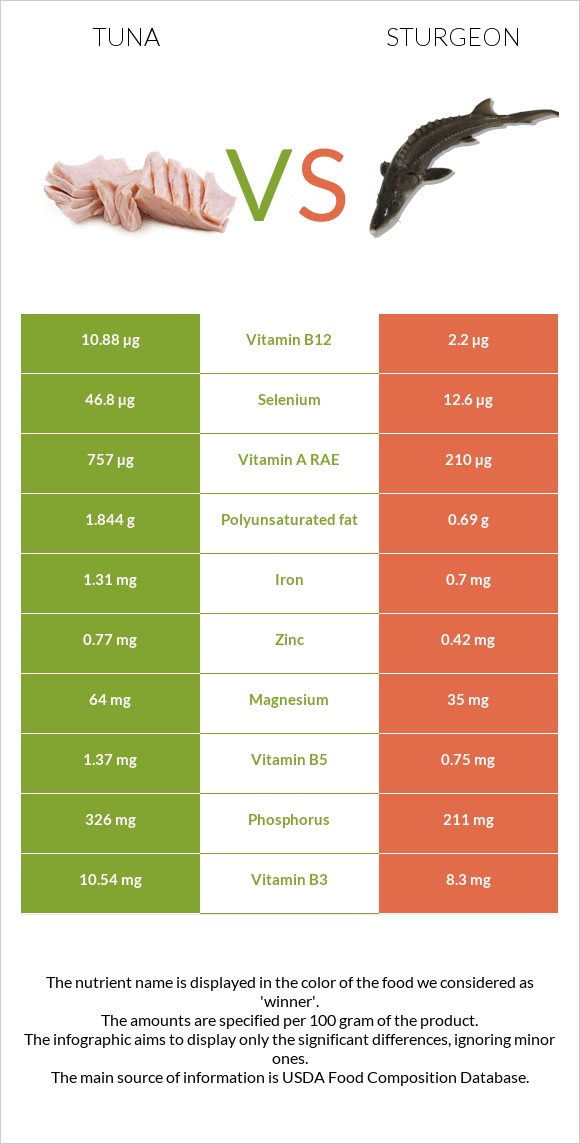Tuna vs. Sturgeon — In-Depth Nutrition Comparison
Compare
What are the main differences between tuna and sturgeon?
- Tuna is richer in selenium, vitamin B3, vitamin B6, and phosphorus, yet sturgeon is richer in vitamin D, vitamin A, vitamin B5, and vitamin B12.
- Tuna's daily need coverage for selenium is 167% higher.
- Tuna has 5 times more vitamin B6 than sturgeon. Tuna has 1.038mg of vitamin B6, while sturgeon has 0.23mg.
- Tuna contains less cholesterol.
We used Fish, tuna, yellowfin, fresh, cooked, dry heat and Fish, sturgeon, mixed species, cooked, dry heat types in this comparison.
Infographic

Infographic link
Mineral Comparison
Mineral comparison score is based on the number of minerals by which one or the other food is richer. The "coverage" charts below show how much of the daily needs can be covered by 300 grams of the food.
| Contains more PotassiumPotassium | +44.8% |
| Contains more PhosphorusPhosphorus | +22.9% |
| Contains less SodiumSodium | -21.7% |
| Contains more SeleniumSelenium | +567.9% |
| Contains more CalciumCalcium | +325% |
| Contains more CopperCopper | +23.3% |
| Contains more ZincZinc | +20% |
| Contains more ManganeseManganese | +130.8% |
Vitamin Comparison
Vitamin comparison score is based on the number of vitamins by which one or the other food is richer. The "coverage" charts below show how much of the daily needs can be covered by 300 grams of the food.
| Contains more Vitamin B1Vitamin B1 | +67.5% |
| Contains more Vitamin B2Vitamin B2 | +52.2% |
| Contains more Vitamin B3Vitamin B3 | +118.5% |
| Contains more Vitamin B6Vitamin B6 | +351.3% |
| Contains more Vitamin AVitamin A | +1095.5% |
| Contains more Vitamin EVitamin E | +117.2% |
| Contains more Vitamin DVitamin D | +545% |
| Contains more Vitamin B5Vitamin B5 | +160.5% |
| Contains more FolateFolate | +750% |
All nutrients comparison - raw data values
| Nutrient |  |
 |
DV% diff. |
| Selenium | 108.2µg | 16.2µg | 167% |
| Vitamin B3 | 22.07mg | 10.1mg | 75% |
| Vitamin B6 | 1.038mg | 0.23mg | 62% |
| Vitamin D | 2µg | 12.9µg | 55% |
| Vitamin D | 82 IU | 515 IU | 54% |
| Vitamin A | 22µg | 263µg | 27% |
| Protein | 29.15g | 20.7g | 17% |
| Vitamin B5 | 0.334mg | 0.87mg | 11% |
| Cholesterol | 47mg | 77mg | 10% |
| Phosphorus | 333mg | 271mg | 9% |
| Fats | 0.59g | 5.18g | 7% |
| Vitamin B12 | 2.35µg | 2.5µg | 6% |
| Monounsaturated fat | 0.138g | 2.486g | 6% |
| Potassium | 527mg | 364mg | 5% |
| Vitamin B1 | 0.134mg | 0.08mg | 5% |
| Polyunsaturated fat | 0.175g | 0.885g | 5% |
| Vitamin B2 | 0.137mg | 0.09mg | 4% |
| Folate | 2µg | 17µg | 4% |
| Saturated fat | 0.205g | 1.173g | 4% |
| Vitamin E | 0.29mg | 0.63mg | 2% |
| Magnesium | 42mg | 45mg | 1% |
| Calcium | 4mg | 17mg | 1% |
| Copper | 0.043mg | 0.053mg | 1% |
| Zinc | 0.45mg | 0.54mg | 1% |
| Sodium | 54mg | 69mg | 1% |
| Manganese | 0.013mg | 0.03mg | 1% |
| Choline | 77.6mg | 70mg | 1% |
| Calories | 130kcal | 135kcal | 0% |
| Iron | 0.92mg | 0.9mg | 0% |
| Vitamin K | 0.1µg | 0.1µg | 0% |
| Trans fat | 0.02g | N/A | |
| Tryptophan | 0.313mg | 0.232mg | 0% |
| Threonine | 1.224mg | 0.907mg | 0% |
| Isoleucine | 1.287mg | 0.954mg | 0% |
| Leucine | 2.27mg | 1.682mg | 0% |
| Lysine | 2.565mg | 1.901mg | 0% |
| Methionine | 0.827mg | 0.613mg | 0% |
| Phenylalanine | 1.091mg | 0.808mg | 0% |
| Valine | 1.438mg | 1.066mg | 0% |
| Histidine | 0.822mg | 0.609mg | 0% |
| Omega-3 - EPA | 0.015g | 0.249g | N/A |
| Omega-3 - DHA | 0.105g | 0.119g | N/A |
| Omega-3 - DPA | 0.005g | 0.058g | N/A |
| Omega-6 - Eicosadienoic acid | 0.002g | N/A |
Macronutrient Comparison
Macronutrient breakdown side-by-side comparison
| Contains more ProteinProtein | +40.8% |
| Contains more FatsFats | +778% |
| Contains more OtherOther | +226.6% |
~equal in
Carbs
~0g
~equal in
Water
~69.94g
Fat Type Comparison
Fat type breakdown side-by-side comparison
| Contains less Sat. FatSaturated fat | -82.5% |
| Contains more Mono. FatMonounsaturated fat | +1701.4% |
| Contains more Poly. FatPolyunsaturated fat | +405.7% |





